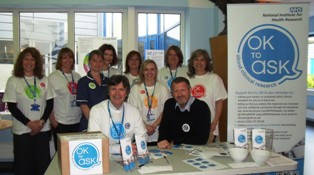
Have you ever considered helping others and helping the NHS to improve by being part of clinical research?
St Mary’s Hospital has joined forces with research organisations around the country to support ‘It’s OK to ask’ – a new campaign led by the National Institute for Health Research to encourage patients to ask their family doctor, nurse or consultant about clinical research.
The ‘It’s OK to ask’ campaign launched on International Clinical Trials Day (20 May), which commemorates the anniversary of the very first clinical trial by James Lind, a Scottish Naval Surgeon who discovered the cure for scurvy two hundred years ago, and is aimed at encouraging patients and their carers to ask their doctors about clinical research and whether it is right for them.
Island patients take part in studies
Clinical Research is a way for health professionals to gather evidence to improve treatments and care for patients in the NHS. Between April 2012 and March 2013, St. Mary’s Hospital recruited 1,172 patients, including some NHS staff, to participate in forty three studies across clinical specialities of Cardiovascular, Immunology & Inflammation, Cancer, Dementia, Diabetes, Mental Health, Stroke and Rehabilitation, Musculoskeletal, Renal & Urogenital, Ophthalmology, Paediatrics, Reproductive Health and Childbirth, Respiratory and Pre-Hospital Care.
Dr Mark Pugh, Medical Director at St. Mary’s Hospital, said:
“Clinical research is thriving in the NHS. However, there is evidence to suggest that until an approach is made by a doctor, nurse or consultant, many patients and carers are unaware that clinical research is taking place and most patients are unaware of local research opportunities which are of particular relevance to them.
“Anyone with a medical condition undergoing treatment, or their carer, are encouraged to speak to a health professional about research and ask what opportunities, if any, might be available to them, their loved one or someone they care for – but remember that not every specialty will be research-active at St Mary’s. By taking part in clinical studies, patients are helping others like themselves and helping the NHS to further improve.”
The benefits
There are benefits of being involved in clinical research. These include getting access to new cutting edge treatments that are not yet widely available. New medicines and treatments must be tested to see how well they work compared to existing treatments to make sure patients get the best possible care.
Patients are looked after by healthcare professionals with expert knowledge which may involve spending more time being closely monitored during a study. Clinical research also helps to prevent disease, or delay its progression, providing wider benefits to the population as a whole and understanding patients’ perspective of their quality of life is integral to trial designs.
Outcomes of research activity
As a result of research activities at the David Hide Asthma & Allergy Centre, located on the Island at St. Mary’s Hospital, there has been better targeting of preventative interventions to manage food allergy in childhood and also guidance for clinicians, health visitors and parents on best infant feeding practices in early life.
Reducing the risk of Deep Vein Thrombosis
In the area of stroke, alternative methods of reducing the risk of Deep Vein Thrombosis (DVT) have been researched. Two trials tested whether graduated compression stockings (similar to flight socks) reduced the risk of DVT after stroke. The results of these trials showed that routine use of graduated compression stockings in immobile stroke patients is not associated with a worthwhile reduction in the risk of DVT. As a result, local practice on the Stroke Unit has changed.
The third trial which has just ended focused on Intermittent Pneumatic Compression (IPC) which are sleeves which contain inflatable air sacs. These are wrapped around both legs and attached to a special air pump which squeeze blood up the veins in the legs; increasing the flow, reducing stagnation and the likelihood of clots forming. This study aims to provide a precise estimate of the effect of IPC on the risk of DVT.
Get involved
The Trust is developing information to promote research opportunities that are available and also to enable patients/carers to register their interest to participate in future studies.
Get involved and be a part of our research – for more information about local clinical research studies at St. Mary’s Hospital contact the Research Department on 01983-552354 or e-mail tracey.tidbury@iow.nhs.uk.


